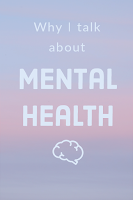I'm taking part in Time To Change's StoryCamp 2020, and the first prompt is to discuss why talking about mental health is important.
I'll be honest, this has caught me at a time where I'm re-evaluating how safe I feel talking about my mental health/illness journey online - especially on twitter. The mental health community on social media definitely has its issues, and this is something that needs to be spoken about a lot more - but I'll save that for a different post.
So, why do I believe it's important to talk about mental health?
When I first started talking about my mental illness experiences I was just venting on twitter. Back when I had around 300 followers nobody really cared about my opinions or what was happening, it was just nice to scream into the void. Now my follower count has reached over 1300 people sometimes mistake me for somebody who knows something, when in reality I'm still pretty much just screaming into the void! The way I use my voice definitely changed as my platform grew, I share a lot less personal details now despite still being extremely open and honest. It feels really great to just put my feelings and opinions out there into the world, especially when I can't express them in my offline life.
Talking honestly about my mental illness and my experiences within the system have helped me educate people on some of the reality of mental illness beyond what is shown in the media. The narrative of mental illness that the media tends to show often erases mental illnesses beyond depression and anxiety, and whilst it's important to talk about these things there are lots of other important stories to tell. As a society we're quick to dismiss people who talk about the less palatable sides of mental illness, and this leaves a lot of people feeling very alone. By adding my voice to the conversation I am able to talk about some of what people rarely discuss - through my twitter account I have managed to reach police officers, doctors, nurses, teachers and a lot of other professions; I've even managed to change a few people's views on some things!
Another - albeit slightly more selfish reason - that I talk about mental illness is to connect with other people and educate myself. Through my twitter connections with other mentally ill people I've learnt about so much, both about myself and about the system. Through what I now know I can be a better advocate for myself and other people - a lot of what I've learnt I would have never found by trawling through articles from google searches. Another benefit of this is that the conversations I have often leave both me and the other person feeling a lot less isolated in our experiences.
One final reason that I believe it's important for everyone to speak up about mental health/illness is to add diversity to the narrative. As a queer disabled autistic there is rarely representation for people like me when mental health/illness is being discussed, but if more people were to speak up and uplift the voices of people who are often misreprsented in all parts of society then this would no longer be the case. Diversity of experiences is important in all conversations - especially those pertaining to health and healthcare. Only good will come from making the conversation more diverse.


Comments
Post a Comment